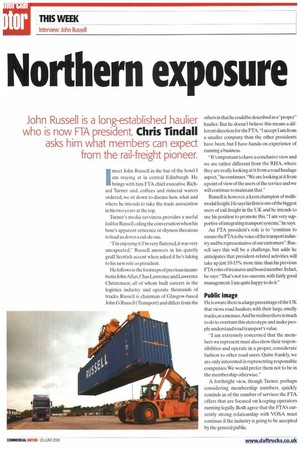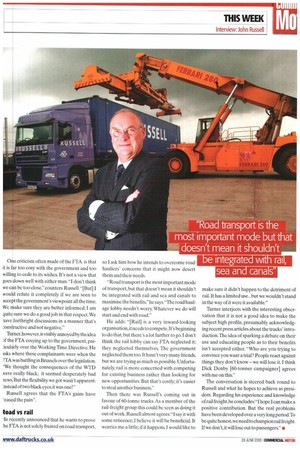Northern exposure
Page 26

Page 27

If you've noticed an error in this article please click here to report it so we can fix it.
John Russell is a long-established haulier who is now ETA president. Chris Tindall asks him what members can expect from the rail-freight pioneer.
Imeet John Russell in the bar of the hotel I am staying at in central Edinburgh. He brings with him FTA chief executive Richard Turner and, coffees and mineral waters ordered, we sit down to discuss how, what and where he intends to take the trade association in his two years at the top.
Turner's media savviness provides a useful foil for Russell, oiling the conversation when his boss's apparent reticence or shyness threatens to lead us down a cul-de-sac.
"I'm enjoying it; I'm very flattered, it was very unexpected," Russell answers in his quietly gruff Scottish accent when asked if he's taking to his new role as president.
He follows in the footsteps of previous incumbents Jolm Allan,Chas Lawrence and Lawrence Christensen; all of whom built careers in the logistics industry and operate thousands of trucks. Russell is chairman of Glasgow-based John G Russell (Transport) and differs from the others in that he could be described as a "proper" haulier. But he doesn't believe this means a different direction for the FTA."I accept I am from a smaller company than the other presidents have been, but I have hands-on experience of running a business.
"It's important to have a conclusive view and we are rather different from the RHA, where they are really looking at it from a road haulage aspect," he continues."We are looking at it from a point of view of the users of the service and we will continue to maintain that."
Russell is, however, a keen champion of multimodal freight. He says his furn is one of the biggest users of rail-freight in the UK and he intends to use his position to promote this. "I am very supportive of integrating transport systems," he says.
An FTA president's role is to "continue to ensure the FTA is the voice of the transport industry and be representative of our customers".Russell says this will be a challenge, but adds he anticipates that president-related activities will take up just 10-15% more time than his previous FTA roles of treasurer and board member. In fact, he says: "That's not too onerous, with fairly good management. I am quite happy to do it."
Public image He is aware there is a large percentage of the UK that views road hauliers, with their large, smelly trucks,as a menace.And he realises there is much to do to overturn this stereotype and make people understand road transport's value.
"I am extremely concerned that the members we represent must also show their responsibilities and operate in a proper, considerate fashion to other road users. Quite frankly, we are only interested in representing responsible companies. We would prefer them not to be in the membership otherwise."
A forthright view, though Thrner, perhaps considering membership numbers, quickly reminds us of the number of services the FTA offers that are focused on keeping operators running legally. Both agree that the FTA's currently strong relationship with VOSA must continue if the industry is going to be accepted by the general public. One criticism often made of the FTA is that it is far too cosy with the government and too willing to cede to its wishes. It's not a view that goes down well with either man. "I don't think we can be too close," counters Russell. "[But] I would refute it completely if we are seen to accept the government's viewpoint all the time. We make sure they are better informed; I am *WI sure we do a good job in that respect. We have forthright discussions in a manner that's constructive and not negative."
Thrnethowever, is visibly annoyed by the idea 31 the FTA cosying up to the government, paricularly over the Working Time Directive. He Isks where these complainants were when the FTA was battling in Brussels over the legislation. 'We thought the consequences of the WTD here really black; it seemed desperately bad iews. But the flexibility we got wasn't apparent Instead of two black eyes, it was one!"
Russell agrees that the FTA's gains have 'eased the pain".
toad vs rail -le recently announced that he wants to prove he FTA is not solely fixated on road transport, so I ask him how he intends to overcome road hauliers' concerns that it might now desert them and their needs.
"Road transport is the most important mode of transport, but that doesn't mean it shouldn't be integrated with rail and sea and canals to maxitnise the benefits," he says."The road haulage lobby needn't worry. Whatever we do will start and end with road."
He adds: "[Rail] is a very inward-looking organisation, it needs to compete. It's beginning to do that, but there's a lot further to go.! don't think the rail lobby can say FTA neglected it; they neglected themselves. The government neglected them too. It hasn't very many friends, but we are trying as much as possible. Unfortunately, rail is more concerned with competing for existing business rather than looking for new opportunities. But that's costly; it's easier to steal another business."
Then there was Russell's coming out in favour of 60-tonne trucks. As a member of the rail-freight group this could be seen as doing it out of work. Russell almost agrees:"I say it with some reticence; I believe it will be beneficial It worries me a little; if it happens, I would like to make sure it didn't happen to the detriment of rail. It has a limited use...but we wouldn't stand in the way of it were it available."
Thrner interjects with the interesting observation that it is not a good idea to make the subject high profile, presumably acknowledging recent press articles about the trucks' introduction.The idea of sparking a debate on their use and educating people as to their benefits isn't accepted either. "Who are you trying to convince you want a trial? People react against things they don't know — we will lose it.! think Dick Denby [60-tonner campaigner] agrees with me on this."
The conversation is steered back round to Russell and what he hopes to achieve as president Regarding his experience and knowledge of rail freight,he concludes: "I hope !can make a positive contribution. But the real problems have been developed over a very long period.To be quite honest, we need to champion rail freight. Ewe don't, it will lose out to passengers." •












































































































































































































